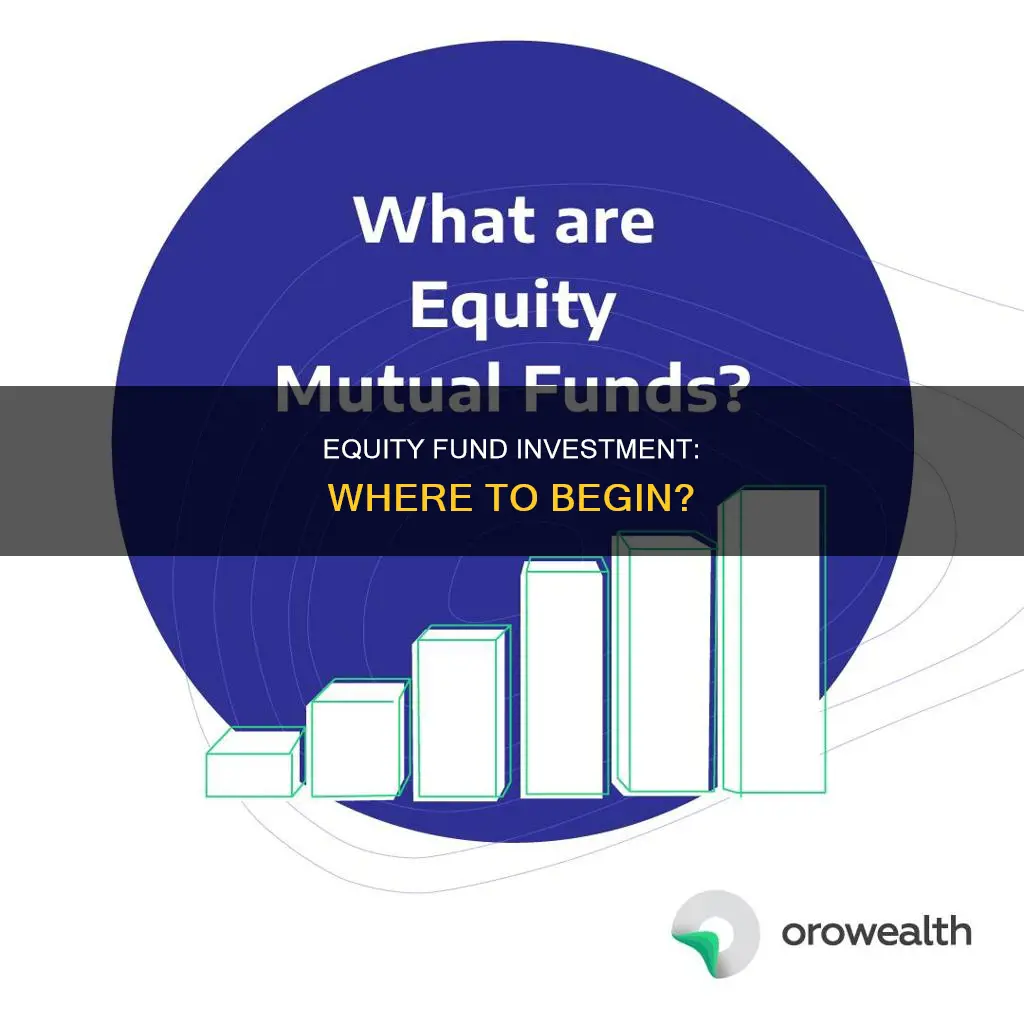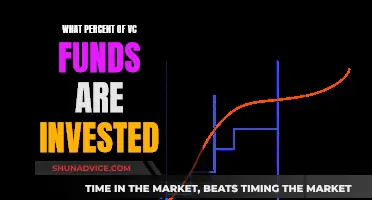
Equity funds are a type of investment fund that pools money from investors to buy a portfolio of stocks. They are also known as stock funds or mutual funds. Equity funds are managed by professionals who aim to deliver maximum returns while keeping risks low. They are a good option for investors who want to invest in the stock market but don't have the time or expertise to do their own research. Equity funds offer diversification, a broad range of investment options, and lower fees compared to investing in individual stocks. When deciding where to invest in equity funds, investors should consider their financial goals, risk tolerance, and investment horizon. Different types of equity funds include index funds, sector-specific funds, and funds focused on company size or location. It is important for investors to carefully research and compare equity funds before making any investment decisions.
| Characteristics | Values |
|---|---|
| Type of investment | Equity funds are a type of mutual fund |
| Investment strategy | Actively managed funds, passive funds, growth funds, value funds, blend equity funds |
| Investment style | Categorised by company size, type of companies, level of diversification |
| Investment universe | Stocks selected by a team of professionals |
| Number of stocks | Most funds have 40-50 stocks in their portfolio |
| Risk | Higher volatility and risk of loss than bonds or cash |
| Returns | Higher expected returns over the long run |
| Dividends | Dividends and capital gains are liable for taxation |
| Management | Professionally managed |
| Initial investment | Requires a minimum initial investment amount |
| Suitability | Investors who want to invest in equities but don't have the expertise or time, investors looking to start with a small amount, investors who can stay invested for more than 5 years |
What You'll Learn

Actively managed vs. passively managed funds
When deciding where to invest in equity funds, it is important to understand the differences between actively and passively managed funds. Actively managed funds are overseen by a professional portfolio manager who makes decisions about which stocks to pick for the portfolio, as well as when to buy, sell, or hold. These funds aim to beat market performance and often come with higher costs. On the other hand, passively managed funds aim to mimic the market's performance and are typically designed to follow a market index. These funds usually have lower fees and may offer better returns.
Actively managed funds are suitable for investors who want to leave the research and analysis to professionals. These investors are willing to pay higher fees for the expertise and active management of their investments. Actively managed funds can be attractive to those who want more hands-on involvement in their investments and believe that the fund manager's expertise can lead to better returns.
On the other hand, passively managed funds are often chosen by investors who want a more hands-off approach and are comfortable with the fund mirroring the market's performance. These investors are cost-conscious and prefer the lower fees associated with passive management. Additionally, some investors may believe that trying to beat the market is challenging and that passively managed funds provide adequate returns without the additional costs.
When deciding between actively and passively managed funds, it is essential to consider factors such as cost, level of involvement, and expected returns. Actively managed funds may provide the potential for higher returns but come with higher fees. They require more active decision-making and stock-picking by the fund manager. In contrast, passively managed funds offer lower fees and a more passive approach, aiming to match the market's performance.
Ultimately, the choice between actively and passively managed funds depends on an investor's preferences, risk tolerance, and investment goals. Some investors may opt for actively managed funds to leverage the expertise of fund managers, while others may prefer the lower-cost and more passive approach of passively managed funds.
Mutual Funds: Risk Scale Placement and Investor Expectations
You may want to see also

Large-cap funds
Large-cap companies have a market capitalisation of over $10 billion. They are often transparent, blue-chip companies with established revenue and earnings, and they are usually market leaders. Large-cap stocks represent a significant portion of the US equity market and are often used as core portfolio holdings. Large-cap funds are required to invest at least 80% of their assets in these top 100 companies.
- Nippon India Large Cap Fund
- ICICI Prudential Bluechip Fund
- Baroda BNP Paribas Large Cap Fund
- Invesco India Largecap Fund
- Edelweiss Large Cap Fund
- Bandhan Large Cap Fund
- Aditya Birla Sun Life Frontline Equity Fund
- DSP Top 100 Equity Fund
- Mahindra Manulife Large Cap Fund
- Canara Robeco Bluechip Equity Fund
- Franklin India Bluechip Fund
- Mirae Asset Large Cap Fund
- LIC MF Large Cap Fund
- PGIM India Large Cap Fund
- Bank of India Bluechip Fund
- Motilal Oswal Large Cap Fund
- Fidelity ZERO Large Cap Index (FNILX)
- Vanguard Developed Markets Index Admiral (VTMGX)
- Fidelity U.S. Sustainability Index Fund (FITLX)
- Fidelity Large Cap Value Enhanced Index Fund (FLVEX)
- Vanguard Dividend Appreciation Index Admiral (VDADX)
- Vanguard 500 Index Fund Admiral (VFIAX)
Investing Funds: Where to Start for Maximum Returns
You may want to see also

Mid-cap funds
When considering investing in mid-cap funds, it is important to keep in mind that these funds are suitable for investors with a long-term investment horizon, typically 7 to 10 years. Mid-cap funds can be volatile in the short to medium term, and investors may experience sharp drops in their portfolio's value. Therefore, these funds are better suited for investors who are willing to accept higher risk in exchange for the potential for higher returns.
Some of the advantages of investing in mid-cap funds include access to high-growth stocks that can provide market-beating returns. Mid-cap companies are also probable future large-cap companies, offering significant growth potential. Additionally, investing in a variety of mid-cap companies provides diversification, cushioning the funds against economic shocks.
When choosing a mid-cap fund, it is important to consider the fund manager's expertise, the fund's historical performance, the expense ratio, and the risk profile of the fund. The competence of the fund manager and their investment strategy can have a substantial impact on the fund's performance. It is also crucial to assess the fund's performance across multiple market cycles, as past performance does not guarantee future outcomes.
- Motilal Oswal Midcap Fund
- Edelweiss Mid Cap Fund
- Nippon India Growth Fund
- Mahindra Manulife Mid Cap Fund
- HDFC Mid-Cap Opportunities Fund
- Invesco India Mid Cap Fund
- Sundaram Mid Cap Fund
- Kotak Emerging Equity Fund
- Baroda BNP Paribas Midcap Fund
- ICICI Prudential Midcap Fund
It is important to note that investing in mid-cap funds carries certain risks, including liquidity risks, market risks, and fees and charges. Mid-cap equities may not be as widely traded as large-cap stocks, making it more difficult for investors to buy and sell shares. Market volatility can also affect mid-cap funds, and these companies may be more sensitive to market swings than large-cap firms.
Vision Fund's WeWork Investment: A Bold Move?
You may want to see also

Small-cap funds
Some of the top-performing small-cap funds include:
- Quant Small Cap Fund
- Nippon India Small Cap Fund
- Bank of India Small Cap Fund
- Invesco India Smallcap Fund
- Edelweiss Small Cap Fund
- Franklin India Smaller Companies Fund
- Canara Robeco Small Cap Fund
- Kotak Small Cap Fund
- Union Small Cap Fund
- Aditya Birla Sun Life Small Cap Fund
- Bandhan Small Cap Fund
- Baroda BNP Paribas Small Cap Fund
- Mahindra Manulife Small Cap Fund
- Motilal Oswal Small Cap Fund
- ICICI Prudential Smallcap Fund
Small-cap stocks have historically outperformed large-cap stocks but are also more volatile and riskier. Small-cap companies have more growth potential than large-cap companies but also carry a greater risk of failure.
Small-cap index funds aim to replicate the performance of small-cap indices like the NIFTY Smallcap 250 or BSE 250 Smallcap. These funds offer the opportunity to invest in small-cap stocks at a low cost due to passive management and without subjective decision-making in stock selection.
UK Pension Funds: Where Is Your Money Invested?
You may want to see also

International funds
- Thematic International Funds: These funds follow a theme-based investing approach, similar to domestic thematic funds. For example, a domestic thematic fund with an infrastructure theme will invest in the stocks of cement, power, and steel companies. An international thematic fund will invest in the stocks of foreign companies within the same theme.
- Region or Country-Specific Funds: These funds invest in the stock markets of a specific region or country, such as the US, Asian markets, Japan, or China. The main objective is to capitalise on the opportunities generated by these markets to achieve good returns.
- Global Markets: Unlike region or country-specific funds, these funds invest globally and aim for diversification. They hold a portfolio of stocks from companies worldwide, leveraging opportunities in different markets simultaneously. Even if one market performs poorly, investments in other markets can make up for the loss.
Equity Funds: When to Invest for Maximum Returns
You may want to see also
Frequently asked questions
Equity funds are a type of investment fund that pools money from investors to buy a portfolio of stocks. They are also known as stock funds or mutual funds. Equity funds are managed by professionals and aim to generate returns for investors, offering diversification and the potential for attractive long-term returns.
Equity funds offer investors a professionally managed and diversified approach to investing in stocks. They provide the potential for superior returns and the benefit of risk management through diversification. Equity funds also offer investors access to a wide range of stocks and markets that would otherwise be difficult or costly to access individually.
Investing in equity funds carries the risk of market volatility and potential losses. The value of equity funds can fluctuate significantly in the short term, and there is always the possibility of losing money. Additionally, equity funds may have various fees and expenses that can impact overall returns.
When choosing an equity fund, consider your investment goals, risk tolerance, and time horizon. Research the fund's prospectus, performance, fees, and investment strategy to ensure it aligns with your objectives. Diversify your portfolio by investing in a mix of broad market funds and industry- or region-specific funds.







